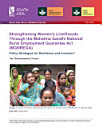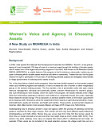Clustering shrimp farms in Bangladesh: A novel effort with mixed outcomes
Kabir, Razin · Belton, Ben · Narayanan, Sudha · Sakil, Abdul Zabbar · Khan, Asraul Hoque · Hernandez, Ricardo
May 2025 · South Asia Policy Perspectives Book 4 · Intl Food Policy Res Inst
Ebook
6
Pages
family_home
Eligible
info
reportRatings and reviews aren’t verified Learn More
About this ebook
Organizing smallholder farmers in clusters has been widely promoted as a way to boost agricultural productivity, streamline delivery of extension services, and improve access to markets. In Bangladesh, where shrimp is an important export crop produced largely by smallholders, government and industry view clustering as key to preventing Bangladesh being left behind in an increasingly competitive global market. Bangladesh’s shrimp exports are highly dependent on the hotel, restaurant, and catering (HoReCa) sector in Europe—a small and relatively low value market segment. Gaining access to the much larger and potentially more lucrative retail market segment in Europe and North America requires high quality, traceable, and - increasingly - certified, shrimp, posing a challenging for Bangladesh.
Rate this ebook
Tell us what you think.
Reading information
Smartphones and tablets
Install the Google Play Books app for Android and iPad/iPhone. It syncs automatically with your account and allows you to read online or offline wherever you are.
Laptops and computers
You can listen to audiobooks purchased on Google Play using your computer's web browser.
eReaders and other devices
To read on e-ink devices like Kobo eReaders, you'll need to download a file and transfer it to your device. Follow the detailed Help Center instructions to transfer the files to supported eReaders.




